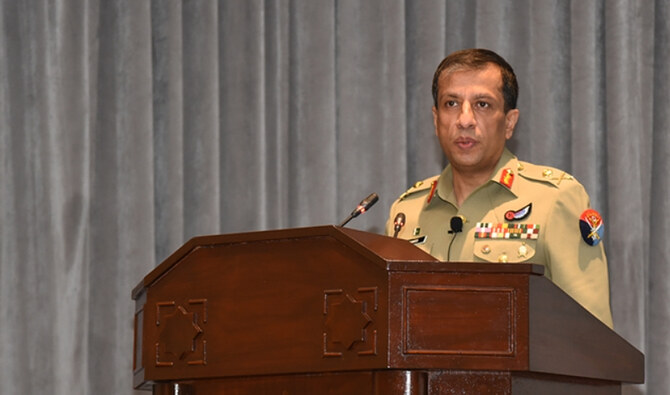ISLAMABAD: The Pakistan army on Thursday acknowledged a “sense of deprivation and perceived notion of state brutality” among the people of Pakistan’s impoverished southwestern province of Balochistan but said these sentiments were being exploited by the country’s “internal and external enemies,” who were behind recent militant attacks also.
The statement comes nearly ten days after separatist militants killed over 50 people in the country’s largest province in a string of coordinated attacks on army and paramilitary camps, police stations, railway lines and highways on the night of Aug. 25-26. Elsewhere in the country, particularly the northwestern Khyber Pakhtunkhwa province, religiously motivated groups like the Pakistani Taliban have also stepped up attacks, daily targeting security forces convoys and check posts, and carrying out targeted killings and kidnappings of security and government officials.
Pakistan has blamed the recent surge in attacks on regional neighbors, including Afghanistan, where it says the coming to power of the Afghan Taliban in 2021 has emboldened anti-Pakistan groups like the Tehreek-e-Taliban Pakistan (TTP). Kabul says it does not allow its territory to be used by terror groups.
Pakistan also says that India and Afghanistan are fomenting militancy in Balochistan, which borders Iran and Afghanistan and has been the site of a decades-long separatist insurgency. Ethnic Baloch militants say they are fighting for secession due to what they see as the unfair exploitation of the province’s mineral and gas wealth by the federation, which denies the charge.
“We are aware that there is a sense of deprivation and perceived notion of state brutality among Balochistan’s people, which certain external forces often exploit,” military spokesperson Lt. Gen. Ahmed Sharif Chaudhry said at a media briefing. “The terrorist attacks on the night of August 25-26 was part of the ongoing game of this external conspiracy and funding.
“These acts were conducted with the assistance of internal and external enemies and their facilitators. The aim was to hurt the peace of Balochistan and its development by targeting innocent civilians.”
The August assaults were the most widespread in the resource-rich province, home to major China-led projects such as a port and a gold and copper mine. Balochistan is an important part of China’s $65 billion investment in the China Pakistan Economic Corridor (CPEC), a wing of President Xi Jinping’s Belt and Road initiative. It also houses key mining projects, including Reko Diq, run by mining giant Barrick Gold and believed to be one of the world’s largest gold and copper mines.
The attacks came as the province was in the grips of protests by an ethnic rights movement led by young Baloch, many of them educated women, who have been calling for an end to what they describe as a pattern of enforced disappearances and human rights abuses by security forces, which deny the charge. The army and government have recently repeatedly referred to the protest movement as a “terrorist proxy,” with independent analysts and politicians calling on the state to take a more even-handed approach to the protesters and take their demands seriously to avoid the province slipping into more instability and violence.
Speaking about ongoing operations against militants, Chaudhry said security forces and law enforcement agencies were conducting over 130 intelligence-based operations across the country daily, with 32,173 operations conducted so far this year in which 90 militants were killed.
“In the last eight months of 2024, 193 officers and soldiers embraced martyrdom during counter-terrorism operations,” the military spokesman said.
COURT MARTIAL OF EX-SPY CHIEF
Commenting on last month’s unprecedented arrest of a former spy chief, Lt Gen (retired) Faiz Hameed, Chaudhry said court martial proceedings initiated against him were based on “concrete evidence.”
“Following a detailed inquiry based on concrete evidence, the Pakistan Army announced on August 12, 2024, that the relevant officer had violated sections of the Army Act,” the military spokesman said, adding that the army had found Hameed to be involved in “several instances of violation of the Army Act,” following which court martial proceedings had been initiated.
Chaudhry said the army believed in “self-accountability.”
“This process of self-accountability works on solid proof and evidence instead of allegations,” he added. “This self-accountability system comes into effect speedily without any discrimination whenever there is a violation of army laws and regulations.”
The military spokesperson said the case against Hameed reflected that the army viewed violations carried out for personal and political motives “very seriously,” and had initiated action according to the law and without discrimination.
Hameed was widely believed to be close to Pakistan’s jailed former Prime Minister Imran Khan when he was PM from 2018-2022. Other than charges relating to a land development case, the military at the time of his arrest also said “multiple instances” of violation of the Pakistan Army Act post-retirement had been found against Hameed, in what was widely seen as a veiled reference to his support for Khan and his party, including in planning the May 9 riots of last year in which protesters linked to Khan’s Pakistan Tehreek-e-Insaf (PTI) party attacked and damaged government and military installations.
Hundreds of PTI followers and leaders were arrested following the riots and many continue to remain behind bars as they await trial. The military has also initiated army court trials of at least 103 people accused of involvement in the violence.
Government officials have repeatedly said Hameed worked with Khan to plan the May 9 riots. Defense Minister Khawaja Asif told Geo TV last month that Khan provided the manpower while Hameed “masterminded the conspiracy.” Current army chief General Asim Munir said in May that there could be “no compromise or deal with the planners and architects of this dark chapter in our history.” He did not name anybody.
Khan is on trial in a civil court for allegedly abetting the My 9 violence, a charge he has denied. But he can face more serious charges of treason and mutiny after Hameed’s arrest. Treason and mutiny are tried by a military court, which is not open to the public, and the charges carry a maximum punishment of death.
Khan has been feuding with Pakistan’s all-powerful military after a falling out with then-army chief General Qamar Javed Bajwa in 2022, following which he was ousted from office in a parliamentary vote that he said was orchestrated by the generals. The army says it does not interfere in political affairs.












